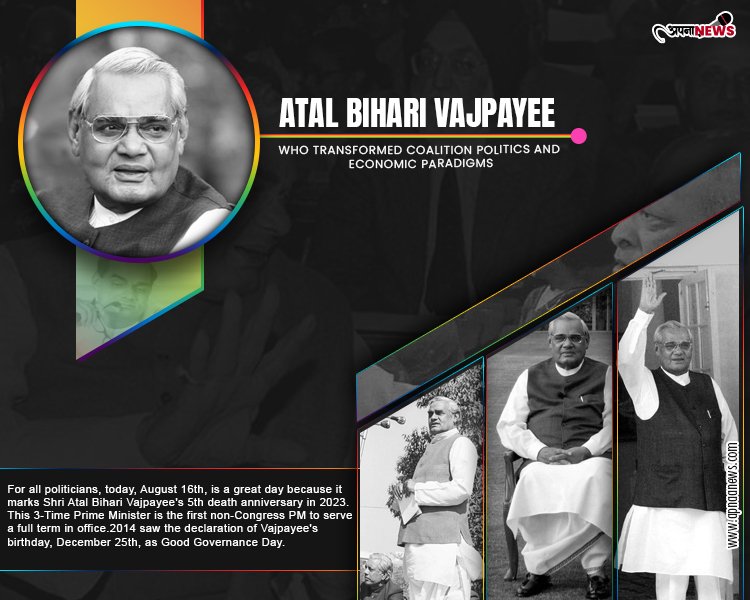Atal Bihari Vajpayee: Who Transformed Coalition Politics And Economic Paradigms
Explore the transformative journey of Atal Bihari Vajpayee. Dive into how he revolutionized coalition politics and reshaped India's economic paradigms.

For all politicians, today, August 16th, is a great day because it marks Shri Atal Bihari Vajpayee's 5th death anniversary in 2023. This 3-Time Prime Minister is the first non-Congress PM to serve a full term in office.
2014 saw the declaration of Vajpayee's birthday, December 25th, as Good Governance Day by the Narendra Modi administration. He received the Bharat Ratna, India's highest civilian distinction, in 2015 from Pranab Mukherjee, the country's president.
Atal Bihari Vajpayee
Atal Bihari Vajpayee, an Indian politician and poet, was the nation's tenth prime minister for three terms:
-
First Term - In May, 1996 for 13 days
-
Second Term - From 1998 and 1999 for 13 months
-
Third Term - From 1999 to 2004 for a full term
Vajpayee was a key leader in the BJP and one of its co-founders.
Atal Bihari Vajpayee Death Anniversary
-
On August 16th, 2023, the entire nation is remembering Shri Atal Bihari Vajpayee. The fact that Atal Bihari Vajpayee served as India's prime minister three times is evidence of how well alliance administrations can be managed.
-
During his term, the Bharatiya Janata Party's (BJP) image was shaped by his visionary leadership and strategic ability, and this reputation enabled the party to achieve an incredible comeback to power with an unparalleled majority ten years later.
How did Atal Bihari Vajpayee Died?
-
Age-related sickness caused his death in 2018. Vajpayee passed away on August 16th, 2018 about 5 o'clock in the evening.
-
He had been taken to AIIMS on June 11th, 2018, with a kidney failure system infection and chest congestion.
-
Then, he was 93 years old. The All India Institute of Medical Sciences verified his death.
Coalition Politics Transformed by Vajpayee
Atal Bihari Vajpayee is a “One man Army” politician in the History of Indian Politics. He has been a Legend and top politician of his time. He struggled a lot to achieve this position.
What is Coalition Politics?
When political parties work together to establish a government, it is known as a coalition government.
Vajpayee's BJP Legacy: Examining the Controversy
-
When Morarji Desai's cabinet was established during the Emergency, Vajpayee assumed the position of foreign minister and made history by being the first leader to address the UN General Assembly in Hindi.
-
The turning point in Vajpayee's political career occurred in 1996 when, after 40 years in the opposition, the BJP formed a government with him as the prime minister. Vajpayee had never been prime minister prior to this period.
-
With 161 seats, the BJP emerged as the single-largest party in the 1996 general election. Then President Shankar Dayal Sharma invited Vajpayee to form the cabinet.
-
The BJP-led combination might total 194 with the help of partners like George Fernandes' Samata Party, Shiv Sena, Akali Dal, and Haryana Vikas Party (HVP). 78 more MPs were still needed to reach the majority.
BJP as Untouchable Political Party
-
During this time, the BJP was viewed as "untouchable" by the majority of political parties. In 13 days, he was compelled to resign.
-
Vajpayee had the option of resigning immediately because he was aware that he would not be able to demonstrate his majority. However, he chose to propose an act of confidence in the Lok Sabha.
-
Vajpayee, a political visionary, wished to end the untouchability threat the BJP was dealing with. He hoped to seize this setback as a springboard for future triumph.
-
The trust vote was made into a tool by Vajpayee for the BJP to facilitate coalition politics in the future. He was a master orator, and his speech was effective in achieving his objective.
BJP’s Successful First Coalition
-
For the first time, BJP was successful in forming a primary coalition. Later, he allied himself with the Trinamool Congress, National Conference, Jammu and Kashmir People's Democratic Party, Telugu Desam Party, Biju Janata Dal, Lok Janshakti Party, and even the DMK.
-
The National Democratic Alliance (NDA), which won the 1998 Lok Sabha elections, was established before those elections.
Pokhran Nuclear Test
-
Vajpayee stunned everyone by conducting five secret nuclear tests at Pokhran on May 11th and 13th, 1998, even though the Congress government of Narasimha Rao had already completed a large portion of the necessary preparations.
-
However, by early 1999, his NDA administration had lost its majority, making a runoff election necessary.
Vajpayee - Third Time Prime Minister of India
-
With a coalition of 13 parties, Atal Bihari was elected prime minister for the third time on October 13th, 1999.
-
This time, his government served its full five-year term, making him the first non-Congress Prime Minister to do so.
Economic Paradigms Transformed by Vajpayee
Throughout the six years that he served as prime minister, from 1998 to 2004, Atal Bihari Vajpayee is recognized for bringing back the India story in the international economy.
Economic Paradigms
A core principle that governs how an economy operates or should operate. With the expansion of e-commerce, a new economic paradigm has evolved.
-
India's economy was opened in 1991 as a result of the massive partnership between Prime Minister Narasimha Rao and Finance Minister Manmohan Singh.
-
Vajpayee was the approachable leader who understood the distinction between personal and professional relationships. Whenever he wasn't in charge, he still represented the Indian government.
-
The way he represented India at the 1994 Geneva mission as an opposition leader, effectively arguing against a resolution that questioned India's sovereignty over Kashmir, is an example of his skillful leadership.
-
In his political career, Vajpayee served in the Lok Sabha ten times and was twice elected to the Rajya Sabha. He later went on to serve as India's first full-term non-Congress Prime Minister.
-
He was confident that if your policies were right, people would support you because he never compromised upon morals.
"Jai Jawan, Jai Kisan, Jai Vigyan" - Vajpayee's catchphrase, represented his dedication to the military, farmers, and scientific advancement. His ability to successfully head a government made up of 24 different parties was an example of his collaborative approach to governing.
Major decisions that changed the Economy
The economic development that is currently on course was sped up by some measures that Vajpayee took to bolster the Indian economy.
When he left office, the Gross Domestic Product (GDP) was 8.4%, the inflation rate was under 4%, and the condition of the foreign exchange reserves was good. In the years that followed, the UPA-I administration enjoyed favorable economic circumstances.
Numerous significant choices made by the Vajpayee administration permanently altered the course of Indian politics.
Road Connectivity
-
He devoted attention to the nation's infrastructure, and the Pradhan Mantri Gram Sadak Yojana secured the villages while the Golden Quadrilateral program joined Chennai, Kolkata, Delhi, and Mumbai with the highway network.
-
Additionally, every child was given access to their fundamental right to education.
Telecom Policy
-
The New Telecom Policy, which kicked off the liberalization of the telecoms sector, was launched by the Indian government on March 3rd, 1999, under Vajpayee's direction.
-
To reduce the participation of the government in the administration of business and industry, it was judged essential to put this measure into action. The telecommunications sector was going through a time of decline and slowing down.
-
India is now the second-largest smartphone market in the world thanks in major part to Vajpayee's policies, and forecasts show that it may soon overtake China.
-
By substantially undermining state-owned telecommunications corporations' dominance, the new telecom policy paved the way for the admission and active participation of private businesses.
-
This change in policy was essential in launching the telecommunications sector revolution that followed.
-
Private company rivalry led to a significant decrease in tariffs and a marked improvement in the standard of services offered. In fact, the success of the private sector in India can be seen in the telecommunications sector.
Act for Budget Management
-
The Financial Responsibility and Budget Management (FRBM) Act, passed in 2003, was one of the important policy initiatives carried out by Vajpayee.
-
This act, which aimed to encourage fiscal restraint in government spending, led to public sector savings in fiscal 2000 equal to -0.8% of GDP.
-
In 2005, the percentage increased to 2.3. To increase industrial production and exports, the administration he led established information technology, industrial parks, and specialized export processing zones.
-
The basis for the Make in India campaign's effective implementation a decade later was laid in large part by this project.
-
The Vajpayee administration's introduction of Asset Reconstruction Companies (ARCs) and credit reporting agencies was a first step in helping banks manage their non-performing loans.
-
Vajpayee's 'India Shining' campaign was unsuccessful in 2004, but it assisted the NDA in continuing his work when it took office again ten years later.
In essence, Atal Bihari Vajpayee's leadership cut across party boundaries and had a lasting impact on the economic and political situation of India.
Personal Facts about Atal Bihari Vajpayee
-
Vajpayee lived all of his life as a bachelor. Namita Bhattacharya, the daughter of his lifelong friend Rajkumari Kaul and his spouse B. N. Kaul was raised by him as his own child. He adopted her & his adopted family lived with him.
-
Vajpayee is believed to enjoy both meat and whisky, in contrast to purest Brahmins who abstain from both.
-
He was a well-known Hindi poet. His published works include Amar Aag Hai and Kaidi Kaviraj Ki Kundalian, a collection of poems composed between 1975 and 1977.
Regarding the poetry he published, he stated:
"My poetry is a declaration of war, not an exordium to defeat. It is not the defeated soldier's drumbeat of despair, but the fighting warrior's will to win. It is not the dispirited voice of dejection but the stirring shout of victory."
Conclusion
August 16th, 2023, which is a special day as it is the 5th Death Anniversary of Shri Atal Bihari Vajpayee, former Indian PM. He transformed Coalition Politics And Economic Paradigms of India.
He was an extraordinary man and a visionary. If you find the above given article useful, Don’t forget to Bookmark this site for more such information about the Gems of India






